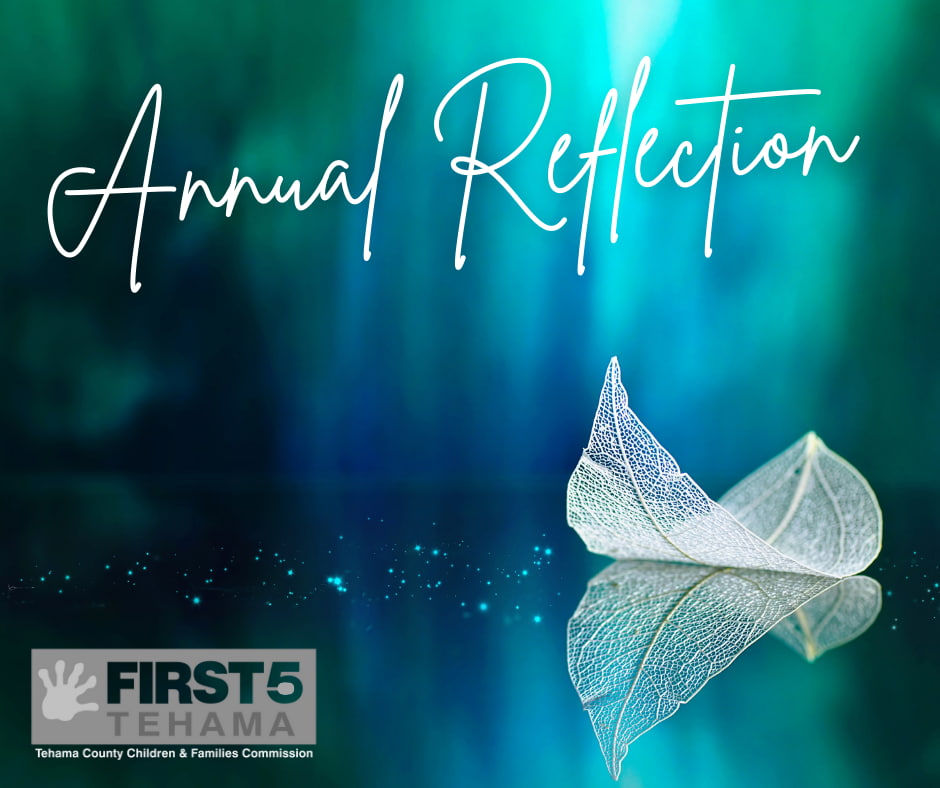
The undeniable energy that permeated 2023, evident in commission initiatives, community events, and project-based endeavors, maxed out the positivity meter. However, within just a few weeks of venturing into 2024, it’s evident that this momentum is seamlessly transitioning into the new year. These recently attained energy peaks are on track to surpass any previous experiences. 2024 is taking on a pivotal role, and all of us in the “pit crew” eagerly anticipate when Tom Cruise will deliver his iconic line, “I am dropping the hammer.”
In preparation for navigating what lies ahead and maintaining our successful course, it is imperative that we consciously hit the pause button. Before diving into the unknown, we must take a purposeful moment to reflect on the lessons of 2023, assess our current position, and strategize how we can leverage prior knowledge to chart our course toward the future we envision.

The First 5 Tehama Commission for Families and Children routinely completes an Annual Impact Report. The comprehensive report is available for viewing HERE. In reflecting on the extensive content, we are reminded of a quote by Stephen Few – “While numbers convey an important narrative, it is up to you to provide them with a voice.” Over the next two weeks, we will highlight two crucial stories from the current year’s report. Keep reading to dive into our first spotlight.
Literacy Levels Linger
Our initial narrative begins with a startling revelation, particularly considering the pivotal role of third-grade reading scores in predicting academic achievements in fifth grade and subsequent high school success. This significance is further underscored by the fact that we are all personally familiar with at least one third-grader grappling with reading difficulties. This struggle often extends to other subjects, resulting in additional math, science, and social confidence challenges. Reading serves as a crucial key to the communication code we inherently possess. Despite this, we observed some unexpected statistics during FY 2022-23.
- Just 25% of our socioeconomically disadvantaged third graders in Tehama County read at or above grade level.
- Tehama County rates were lower than statewide CA rates, showing 31% of socioeconomically disadvantaged third graders reading at or above grade level.

The reading journey begins with exposure to language from infancy, evolves through handling and “consuming” books as a toddler, and advances to actively participating in storytelling as a preschooler. These fundamental developmental activities underscore parents’ pivotal role as the most influential tool in transforming the current alarming 25% to an attainment well beyond 80%, aligning with what Tehama County children deserve.

The Annual Impact Report from First 5 Tehama presents additional evidence supporting the effectiveness of early reading support for parents and emphasizes the growing need for such assistance. Utilizing the Family Intake Form (FIF), our organization captures a snapshot of family characteristics. In the fiscal year 2022-23, 85 parents and caregivers participated in completing the FIF, with 81 unduplicated individuals (accounting for duplicates when families engaged in multiple programs). Notably, these responses reveal a significant opportunity for parents to spend more time reading with their children. Furthermore, the findings emphasize that parents who feel supported or clearly understand their child’s developmental milestones are likelier to engage in frequent reading sessions with their children.
- Only 31% of those surveyed reported reading books with their children five to seven times a week at intake.
- Participants who documented reading less than two times a week (n = 40) were less likely to feel supported as a parent (18% “not at all true” or “not very true”).
- Additionally, 15% of participants lacked knowledge about what to expect at each age in their child’s growth and development. This lack of understanding makes it challenging to determine when and how to read and engage with their child effectively.

Up to this point, the data emphasizes the requirement for targeted assistance in early literacy. Consequently, we turn our attention to parenting programs that specifically address this need. During the fiscal year 2022-23, the Help Me Grow Program, supported by First 5 Tehama and managed by the Tehama County Department of Education, implemented an evidence-based Home Visiting model through Parents as Teachers for families seeking and anticipated to gain substantial benefits from these comprehensive services. This approach has a well-established track record of enhancing various aspects of child development and family well-being, encompassing, but not limited to, the following.
- Parents are more engaged in literacy activities at home* and in their child’s future.**
- More than 75% of the low-income children who participated in Parents as Teachers and/or Preschool were rated by their teachers as ready for kindergarten.**
- Children achieve school success into the elementary grades.**
REFERENCES: *Johnson-Reid, M., Drake, B., Constantino, J., Tandom, M., Pons, L., Kohl, P., Roesch, S., Wideman, E., Dunnigan, A., Auslander, W. (2018). A Randomized Trial of Home Visitation for CPS-Involved Families: The Moderating Impact of Maternal Depression and CPS History. Child Maltreatment, 23: 281-293. **CDC. First reports evaluating the effectiveness of strategies for preventing violence: early childhood home visitation: Findings from the Task Force on Community Preventive Services. www.cdc.gov/mmwr/preview/mmwrhtml/rr5214a1.htm MMWR 2003;52(RR-14):1-9
Employing this model, Home Visitors delivered evidence-based services to 31 caregivers and 35 children (19 under the age of 3 and 16 between the ages of 3 and 5). There was a 55% decrease in Home Visits compared to FY 2021-22, where 67 caregivers and 78 children were served. This reduction is directly attributed to the decline in Proposition 10 funds allocated to First 5 Tehama. The positive impacts highlighted earlier are experienced locally as well. Home Visitors conducted pre- and post-assessments using an observation tool, the “Parenting Interactions with Children: Checklist of Observations Linked to Outcomes.” This tool measures parenting effectiveness across four major domains: affection, responsiveness, encouragement, and teaching. Statistically significant changes were observed between pre and post-tests in all domains, with the teaching domain showing the most substantial increase—from a pre-test average of 9.6 to a post-test average of 14.7.
The Teaching domain correlates with the development of emergent literacy skills and is a positive predictor for enhanced cognitive, language, and social development. Additionally, it contributes to increased language proficiency and conversational skills.***

Also, it is important to note the demographic characteristics of the 31 caregivers and 35 children. Nearly all children were Hispanic/Latino (94%), and more than half (54%) spoke Spanish as their primary language. Often, Home Visits happen in the community, so our professionals may serve as language and cultural translators to support some families. These communications play a long-lasting role in literacy and reading development through environment and community.
For example, a mother who attended a story hour event was new to the area and unaware of the local library’s existence. This participant primarily communicates in Spanish with limited English proficiency. However, she received helpful translation assistance from HMG staff. During the event, she and her 2-year-old actively engaged in reading activities, obtained a library card, and borrowed books. Despite language barriers, she communicated with another mother, establishing a vital connection – they now regularly meet at the library. Following the mother’s initial visit, she returned to the library on the same day for the afternoon story hour with her school-aged children, checking out additional books.
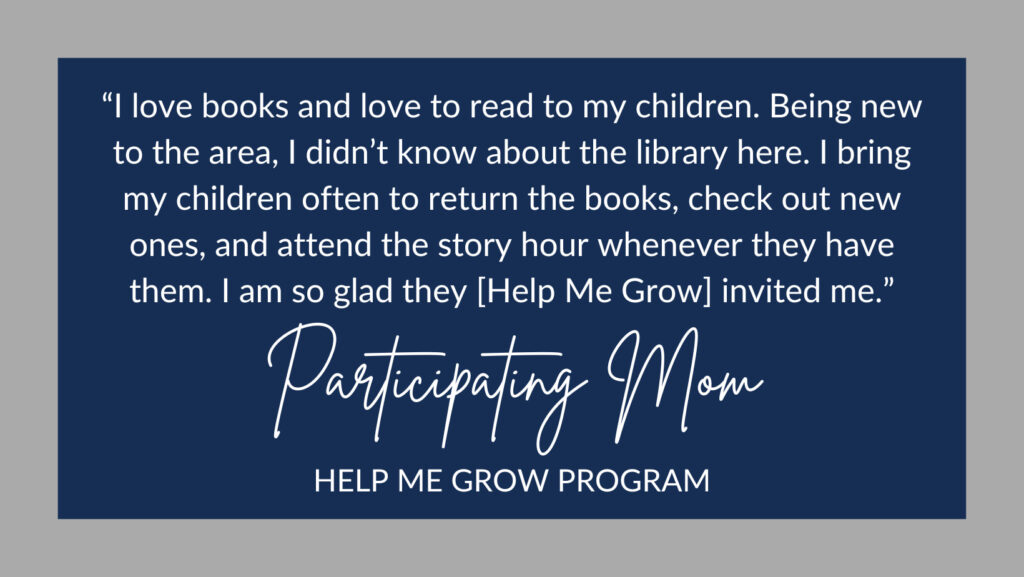
Another crucial approach employed by First 5 Tehama to encourage early literacy is the First 5 Book Club, boasting 340 children aged 0-5 registered as of June 30, 2023. While most participants spoke English as their primary language, one in five children (19%) primarily spoke Spanish. Thirty-nine Book Club participants responded to a follow-up survey, sharing the following insights.
- Enjoyed books and activities
- Appreciated the variety of reading options and the assortment of English and Spanish materials
- 82% somewhat or strongly agreed that the Book Club increased how often they read with their child(ren)
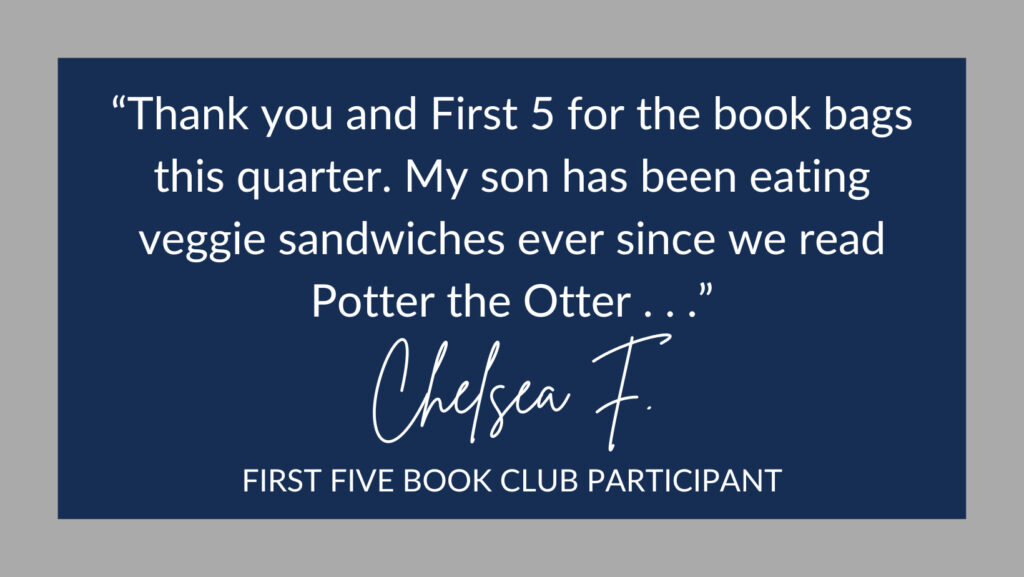

Parents aren’t the sole influencers in the literacy narrative. The community also plays a significant role. Literacy contributes to poverty mitigation, job creation, and positive impacts on health.
In the fiscal year 2021-22, First 5 Tehama introduced Badges with Books, an outreach program to involve the community and families in literacy activities. Its goal was to encourage participation in other 0-5 programs in the county and to foster a positive perception of police officers as role models promoting the value of books and literacy. Throughout the fiscal year 2022-23, Badges with Books expanded its reach, growing from five to nine local department partners.
- Corning Police Department
- Red Bluff Police Department
- Tehama County Probation
- Tehama CalFire
- Tehama California Highway Patrol (CHP)
- Dignity Health EMT
- Red Bluff Fire Department
- DA Victim Witness
- Tehama County Sheriff
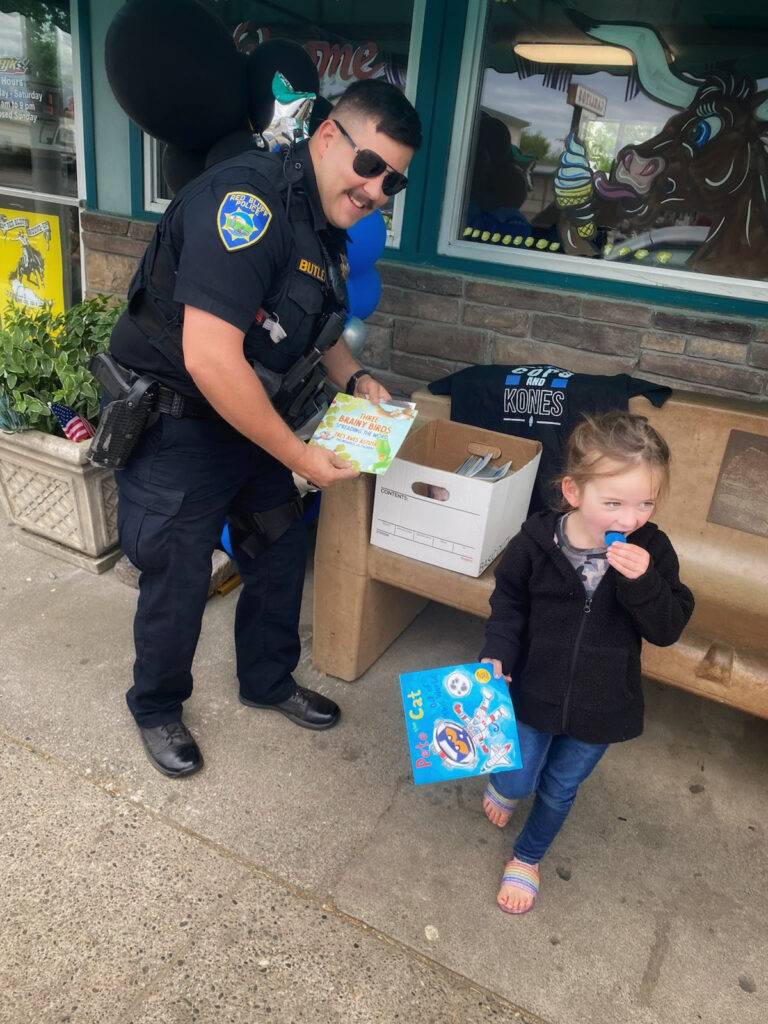
Our organization introduced a new fiscal year 2022-23 initiative— the Business with Books program. Under this program, First 5 collaborates with local businesses, supplying them with a box of books, information about registering for the First 5 Tehama Book Club, and other 0-5 programs. The idea garnered swift support, with 26 local businesses participating. If you want to learn more or become a book host, please contact abrinkman@first5tehama.com.
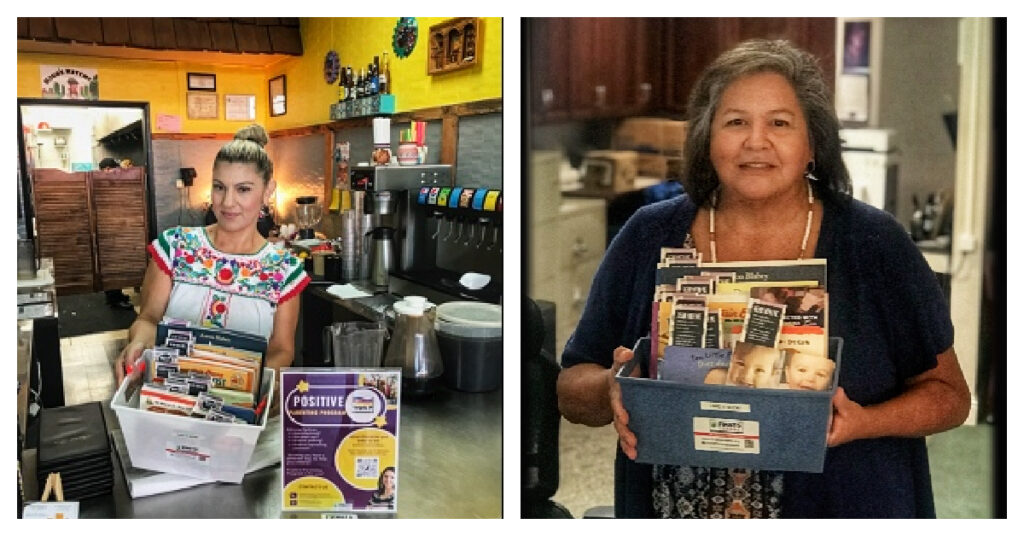
Next Steps
What’s the next step in this story? Let’s quickly recap what we’ve learned:
- We must strive for better outcomes for our children because a 1 in 4 success rate for reading is unacceptable.
- The foundation for 3rd-grade reading is laid in the laps of our families and childcare providers right from birth, emphasizing that supporting reading is synonymous with supporting families.
- Community involvement is crucial – we all have a role to play.
Now, let’s delve into some exciting developments on the horizon. First, First 5 Tehama has collaborated with the Tehama County Education Foundation to introduce Dolly’s Imagination Library to our region. This partnership ensures that every child under five can enroll for free books delivered straight to their homes each month. Red Bluff Rotary, Active 20-30 Club, Tehama Reads, and the Local Planning Childcare Council have already stepped forward to ensure our success. Together, we are committed to providing every Tehama County child with access to and enthusiasm for books right from day one! Sign up for the First 5 Book Club to be the first to hear about the opportunities for Imagination Library – HERE.

Moving forward, our attention is directed toward comprehending the developmental phases of our children, emphasizing the importance of aligning our efforts both at school and home. We are intensifying our commitment to Ages and Stages Screeners to achieve this. If you looked over the complete report earlier, you likely noticed that we’ve conducted over 500 screenings for 3- and 4-year-olds. Of these screenings, 14% of the children identified required additional attention in communication (including language and literacy). Recognizing this allows families and educators to concentrate their efforts and provide early support, bypassing the need to wait until the 3rd grade. We aim to double our screening initiatives by facilitating new partnerships with school districts and garnering support from initiatives like Corning Promise. We invite you to be part of our movement by completing a developmental screening for the children in your care today! Alternatively, we would like to ask you to share this information with someone you know.
As we conclude our initial narrative, we are already crafting the second installment of our yearly reflection. We are excited to share additional insights, strategies, and accomplishments. Keep an eye out for our second story, scheduled to be released by the end of the month. Thank you for another wonderful year.


